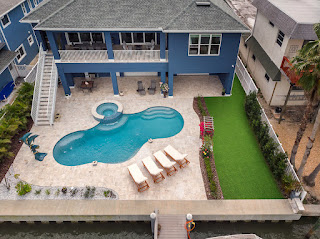Jordan Hidalgo: Eco-Friendly Pool Solutions: Sustainable Ways to Enjoy Your Pool
Swimming pools provide relaxation, fun, and fitness benefits, but they can also consume large amounts of water and energy. Fortunately, eco-friendly pool solutions are becoming more popular, allowing pool owners to enjoy their pools sustainably while reducing their environmental impact. From solar heating to natural pools, there are many ways to make your pool more energy-efficient and environmentally friendly.
1. Solar Pool Heating: Harnessing the Sun’s Energy
One of the most effective ways to make your pool eco-friendly is by using solar heating. Traditional pool heaters consume large amounts of electricity or gas, but solar heaters use the sun’s energy to warm the water naturally.
Benefits of Solar Pool Heating:
Reduces reliance on fossil fuels and lowers energy costs.
Provides a renewable and sustainable heating solution.
Extends the swimming season by keeping the pool at a comfortable temperature.
Solar heating systems work by circulating pool water through solar panels, which absorb heat from the sun before returning the warm water to the pool. These systems can significantly cut down on heating expenses while reducing your carbon footprint.
2. Natural Pools: A Chemical-Free Alternative
Natural pools are an excellent option for those looking to avoid chlorine and other harsh chemicals. These pools use biological filtration and aquatic plants to keep the water clean and safe for swimming.
Advantages of Natural Pools:
No need for chlorine or other chemical disinfectants.
Supports biodiversity by creating a small ecosystem.
Requires less maintenance and lower long-term costs.
A natural pool consists of a swimming area and a regeneration zone filled with plants and beneficial bacteria that naturally purify the water. These pools are not only environmentally friendly but also add a beautiful, natural aesthetic to any backyard.
3. Energy-Efficient Pool Pumps and Filters
Traditional pool pumps and filters consume a lot of electricity, but modern energy-efficient models can significantly reduce power consumption.
Ways to Improve Pool Pump Efficiency:
Use a Variable-Speed Pump: These pumps adjust their speed according to the pool’s needs, saving energy.
Optimize Filtration Time: Running the pump for shorter, optimized cycles reduces electricity usage.
Invest in Cartridge Filters: These require less backwashing, conserving water and reducing waste.
By upgrading to an energy-efficient pump, pool owners can lower electricity costs while maintaining a clean and healthy pool environment.
4. Saltwater Pools: A Gentler Alternative to Chlorine
Saltwater pools use a salt chlorinator to produce chlorine naturally, reducing the need for added chemicals.
Benefits of Saltwater Pools:
Softer and less irritating on the skin and eyes.
Lower chemical usage compared to traditional pools.
More cost-effective in the long run.
Saltwater pools still require maintenance, but they use significantly fewer chemicals, making them an eco-friendly and swimmer-friendly alternative.
5. Pool Covers: Reducing Water and Heat Loss
Using a pool cover is one of the simplest and most effective ways to make a pool more eco-friendly. A high-quality cover helps retain heat, reduce evaporation, and keep debris out of the water.
Advantages of Pool Covers:
Prevents up to 90% of water evaporation.
Reduces the need for chemical treatments by keeping out debris.
Helps maintain water temperature, reducing heating costs.
Solar pool covers, in particular, are an excellent option because they use sunlight to passively warm the pool while preventing heat loss.
6. Rainwater Harvesting for Pool Refilling
Instead of using tap water to refill pools, rainwater harvesting systems can collect and filter rainwater for this purpose.
Why Use Rainwater?
Reduces freshwater consumption and conserves resources.
Lowers water bills by utilizing free rainwater.
Minimizes environmental impact by reducing reliance on municipal water sources.
By installing rainwater collection systems and proper filtration, pool owners can use nature’s water supply efficiently and sustainably.
Final Thoughts: A Greener Way to Swim
Eco-friendly pool solutions not only help reduce environmental impact but also offer long-term cost savings and healthier swimming conditions. Whether through solar heating, natural pools, energy-efficient pumps, or rainwater harvesting, making small changes can significantly improve the sustainability of your pool.
By embracing these green innovations, pool owners can enjoy a refreshing swim while contributing to a healthier planet.


.jpeg)
Comments
Post a Comment